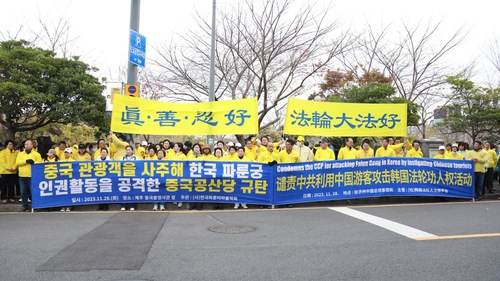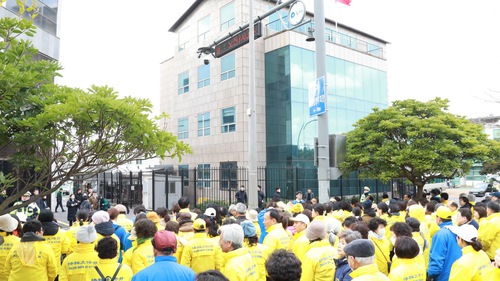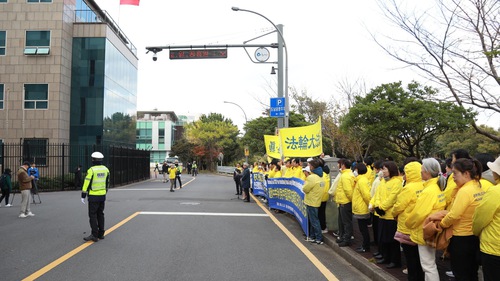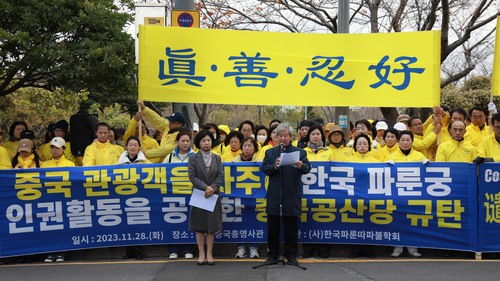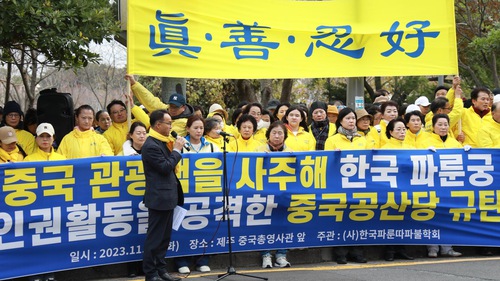(Minghui.org) Seven incidents of Chinese people attacking Falun Gong information booths took place on Jeju Island, South Korea between October and November 2023.
The South Korean Falun Dafa Association said that the incidents didn’t happen by coincidence but were organized by the Chinese Communist Party (CCP). The perpetrators selectively destroyed poster boards about the Tiananmen self-immolation hoax, the CCP’s organ harvesting from Falun Gong practitioners, and “The CCP doesn’t represent China.” They are demanding that the local procuratorate and court investigate the matter and bring the perpetrators to justice.
Perpetrator Indicted
The latest incident took place at around 11: 30 a.m. on November 18, 2023. According to Falun Gong practitioner Kim Jong-kun, during the brief moment he stepped away from the booth, a group of seven Chinese youth who had been wandering around for at least ten minutes went over and kicked the poster boards. One person destroyed the posters and even tried to burn them with a lighter. The other six people stood aside and watched him. Given the fact that they exchanged glances, it’s clear they came as a group and were not regular tourists.
 Perpetrator destroying Falun Gong poster boards (Photo taken by Kim Jong-kun)
Perpetrator destroying Falun Gong poster boards (Photo taken by Kim Jong-kun)
Kim quickly called the police. When the police arrived, they ordered the Chinese ten times to show their IDs, but they refused to comply. The person who destroyed the posters also resisted strongly when the police took out the handcuffs. He was eventually arrested and taken to the Jeju Eastern Police Station Detention Center.
This was the first person in the past two months who was arrested for destroying Falun Gong posters.
Shortly after the arrest, the police submitted the case to the prosecutor’s office. The prosecutor then indicted the perpetrator and moved the case to the Jeju District Court, demanding a fine of 500,000 South Korean wons (about 385 USD).
The incident was also reported by the major local TV channel Jeju MBC.
South Korean Falun Dafa Association Demands Thorough Investigation
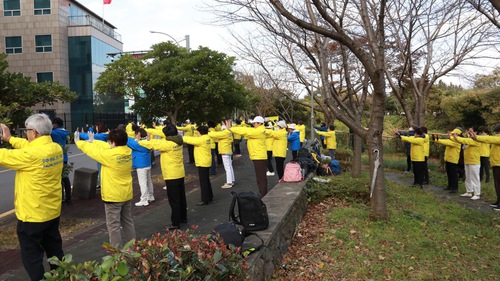 Falun Gong practitioners rally to demand investigation and punishment of perpetrators
Falun Gong practitioners rally to demand investigation and punishment of perpetrators
Falun Gong practitioners held a rally on November 28 in front of the Chinese Consulate General in Jeju, demanding that the Chinese ambassador to South Korea formally apologize for the incident. They also urged the South Korean government to take measures to prevent similar incidents from happening again. About 200 practitioners attended the event.
The practitioners said at the event that the CCP is likely attempting to turn South Korea into another Hong Kong, where it has direct control. They added that local residents should have a clear understanding of the CCP and protect their own country from being infiltrated by the authoritarian regime. The practitioners distributed letters to local residents as well.
The South Korean Falun Dafa Association also submitted their statements to the Governor of Jeju Island, Speaker of the Jeju Island Assembly, Jeju District Attorney General, Jeju Island Police Director, and the Jeju District Marine Police Director, demanding that the perpetrators be brought to justice in accordance with the law.
One day before the rally, a cruise with 2,680 Chinese tourists heading to Jeju Island from the port city of Tianjin suddenly changed its route and cancelled their stay on Jeju Island, likely to avoid having the Chinese tourists from seeing the practitioners’ rally.
Background
Jeju Island has been a popular tourist destination for the Chinese. Since 2008, the South Korean government has allowed people from China to enter the island without a visa and stay for up to 72 hours. While tourism slowed down during the pandemic, South Korea is taking active measures to bring back the Chinese tourists.
To help Chinese tourists learn the facts they aren’t able to see while in China, Falun Gong practitioners in South Korea set up several information booths in Jeju Island, which are now under attack by the CCP.
All content published on this website is copyrighted by Minghui.org. Minghui will produce compilations of its online content regularly and on special occasions.



